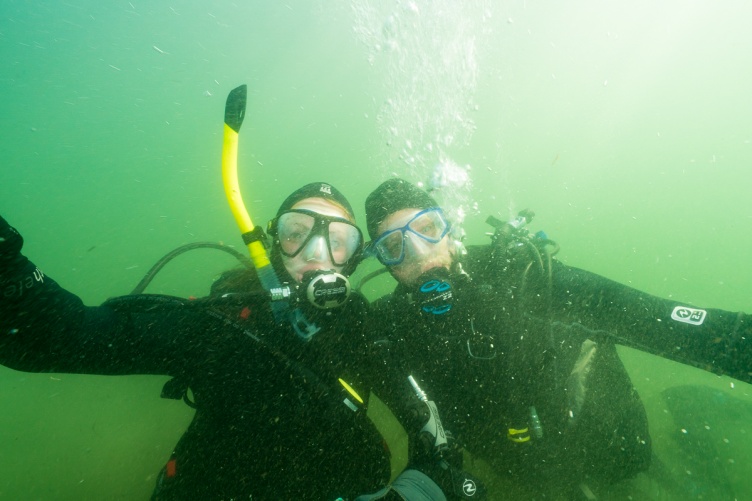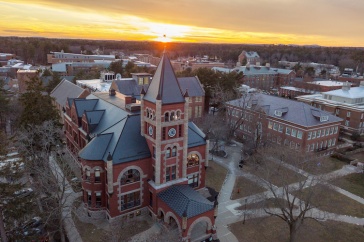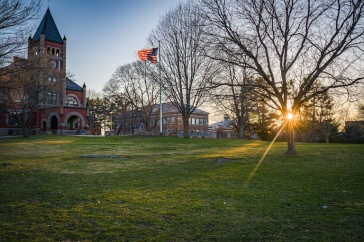
Dr. Win Watson and Meghan Owings. This photo was submitted to last year's "selfie with your advisor" competition through the Graduate School. Courtesy photo.
Above Win Watson’s desk hangs a retirement gift: the “Watson Lab Tree,” an illustration representing all the students who worked for him the past 41 years at UNH.
The zoology professor’s students presented him the gift during a retirement party at his Madbury farmhouse, which featured a tent and guest list of 120 people. Many of those students traveled cross-country and camped in his backyard to attend. He says one of retirement’s perks is hearing the impact he’s had on students’ lives.
“You get all these cathartic, touching notes from people who would not have taken the time to do that otherwise,” Watson says.

Watson — whose research involves lobsters, horseshoe crabs, fish physiology and behavior, and nudibranch neurobiology and behavior — is leaving his day job on a high note. He’s the winner of the 2019 Graduate Faculty Mentor Award and in the midst of several projects involving climate change’s impact on the animals he studies. He has also published 100 papers — many of which were co-authored by his graduate students.
He’s come a long way. Watson was a graduate student himself when he applied for the UNH job. He wasn’t expecting an interview, never mind an offer.
“I was relaxed, because it was just practice. And then I got the job,” he says. “So when I started, I was almost [the graduate students’] age, and my wife, who is younger than me, was their age. I think I spent more time with graduate students than faculty when I first started to work here, and that just kind of continued.”
Building these relationships with graduate students has been crucial to his and his students’ success.
“One of the things I learned early on from some of my mentors is to treat my students like I would want my kids to be treated,” he says. “It goes beyond science.” For instance, if a student is in the hospital, he might visit him or her. If something seems wrong, he’ll ask about it. If it’s a student’s birthday, maybe he’ll take the lab students out to play paintball.
The outcome involved results in the lab, certainly, but also lifelong affection from his students. To date, Watson has been invited to 16 student weddings, and one former student, Chris Dufort, asked Watson to give a wedding toast.
“He’s really smart, first of all, and second, he’s got all this strange, out-of-left-field wisdom about everything. He’s always had good advice for me,” says Dufort, who credits Watson to placing him on the right career path — and not even a scientific one. Dufort’s job in Watson’s lab began as a research assistant but slowly morphed into the “de facto” computer guy for the zoology department before such a position even existed.
“In some sort of bizarre way he was able to steer me toward computers, something I didn’t even know I liked. He has this way of seeing what you can do and nurturing it,” Dufort says. “When all is said and done, besides my parents, Win has had the biggest direction in my life.”
Watson has worked with both graduate and undergraduate students, but he says the Master’s and Ph.D. students were really the glue holding the lab together.
“At any given time, I only have so many hours in a day. I can only keep track of so many projects. By the time grad students have been here a year or two, they know more than I do about their particular project,” he says. “The undergrads, who work in my laboratory, they’re really working with the graduate students and less directly under my supervision.”
His love and respect for sports played an important role in how he thought about the lab and his career. In his field, you need to be able to work as a team in order to succeed.
“You’re in kind of a race in your field to make these discoveries. If you have a team, you can do it faster. And so, with a team, you can also get better,” he says. “But you know, the thing no one ever talks about that sort of lies in the back of hidden recesses of my brain is I’ve always been a competitor. … You don’t go into this business because you want to be famous. But I want to be the best at what I’m doing.”
What he’s found is that everything feeds everything else. If you want to produce good research, then you must train the students in your lab to produce good work. If you want students to want to work with you, then you need to publish.
“I realized early on, if I want people to listen to me, I have to earn their respect. In the scientific world, you earn their respect by publishing papers. So you’re publishing papers, and then you get another grant. And you use that grant to publish more papers. And all that trickles down to having successful students in the laboratory,” he says. “If your basic mantra is, 'I want to be better,' then after 40 years, you’re going to be pretty good, because every year you’re re-evaluating and trying to improve.”
-
Written By:
Kelly Sennott | Grad School



















































